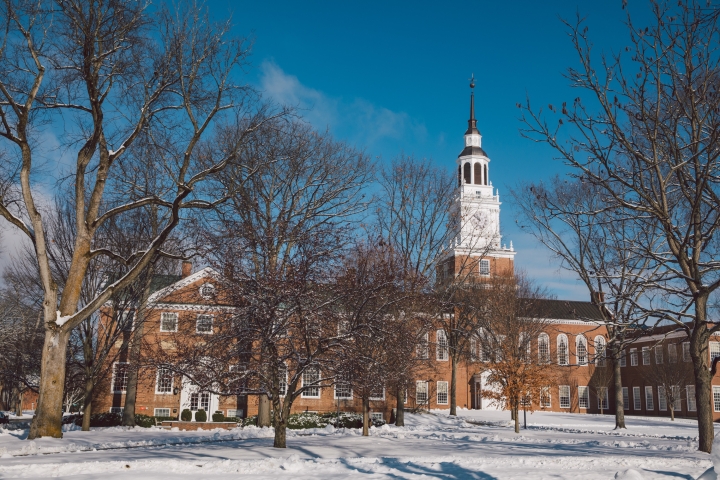As the number of people testing positive for COVID-19 increases locally and across the country, Dartmouth may need to impose additional restrictions related to the pandemic that could affect the undergraduates scheduled to be on campus for winter term, Provost Joseph Helble told students and the wider Dartmouth community yesterday.
Facing the possibility of living in what could be a more restricted environment, undergraduates are welcome to stay where they are and continue learning remotely. Those deciding to stay home will receive a full refund of their room and board payment, Helble said.
“I realize that this will present many of you with a difficult decision to make in the next several days. We are truly sorry that you are facing this predicament. As you know, it is essential for us to continue to do all that we can to support your health, and the health of our entire community,” he wrote in an email to all undergraduates which was later sent to all faculty, staff, graduate students, and to the families of undergraduates.
“We recognize that the decision on whether to come to campus is an individual one, depending on your priorities and circumstances. Some of you who are approved for on-campus enrollment may choose to be on campus, others may prefer remaining at home or in their current location. The decision is yours to make,” said the provost.
The number of students and employees testing positive for the virus has been increasing, and Helble said national trends suggest that the increases are likely to continue.
“The percentage of positive cases in pre-arrival testing has reached 1% of local students. This level, along with other variables including the number of positive tests in our community and the positive cases in Grafton County—a local per capita level that is now 10 times higher than it was in October—is where we find ourselves this week,” he wrote.
Students scheduled to be in residence during winter term are to arrive this weekend. About half of the undergraduates have been approved to be on campus for the term. While in residence, they will continue to take most classes remotely, as students have done in previous terms during the pandemic. Classes began remotely for all undergraduates on Jan. 7 and the date for them to come to campus was in December moved ahead two weeks in anticipation of an increase in COVID-19 cases locally and nationally.
Students in Dartmouth’s graduate and professional schools live mostly off campus and are less likely to be affected by more restrictive campus operations. Their class and research schedules are different from the undergraduate calendar.
Helble said that undergraduate restrictions could include periods of time when students would need to be quarantined in their rooms (beyond their initial eight-day arrival quarantine); to-go meals that may need to be eaten in students’ rooms; reduced or no access to buildings such as the library, labs, and the gym; and cancellation of some or all of an expanded slate of outdoor activities currently being planned.
If students choose to leave campus during the term, they will need medical clearance to do so and, said Helble, it is possible that state or national restrictions on travel could result in students having to stay on campus.
There will not be an option for the on-campus undergraduates to delay their arrival in Hanover, Helble said, because managing quarantine timing and testing and the use of shared facilities require coordination that would be too difficult to manage over a period of weeks.
“Thank you for your understanding during this rapidly-evolving situation. We are a strong, supportive community and I know that—as difficult as it has been and will continue to be—we will get through this term and this year. We will continue to be resilient in the face of this pandemic and we will adapt to these challenging circumstances,” Helble wrote.

